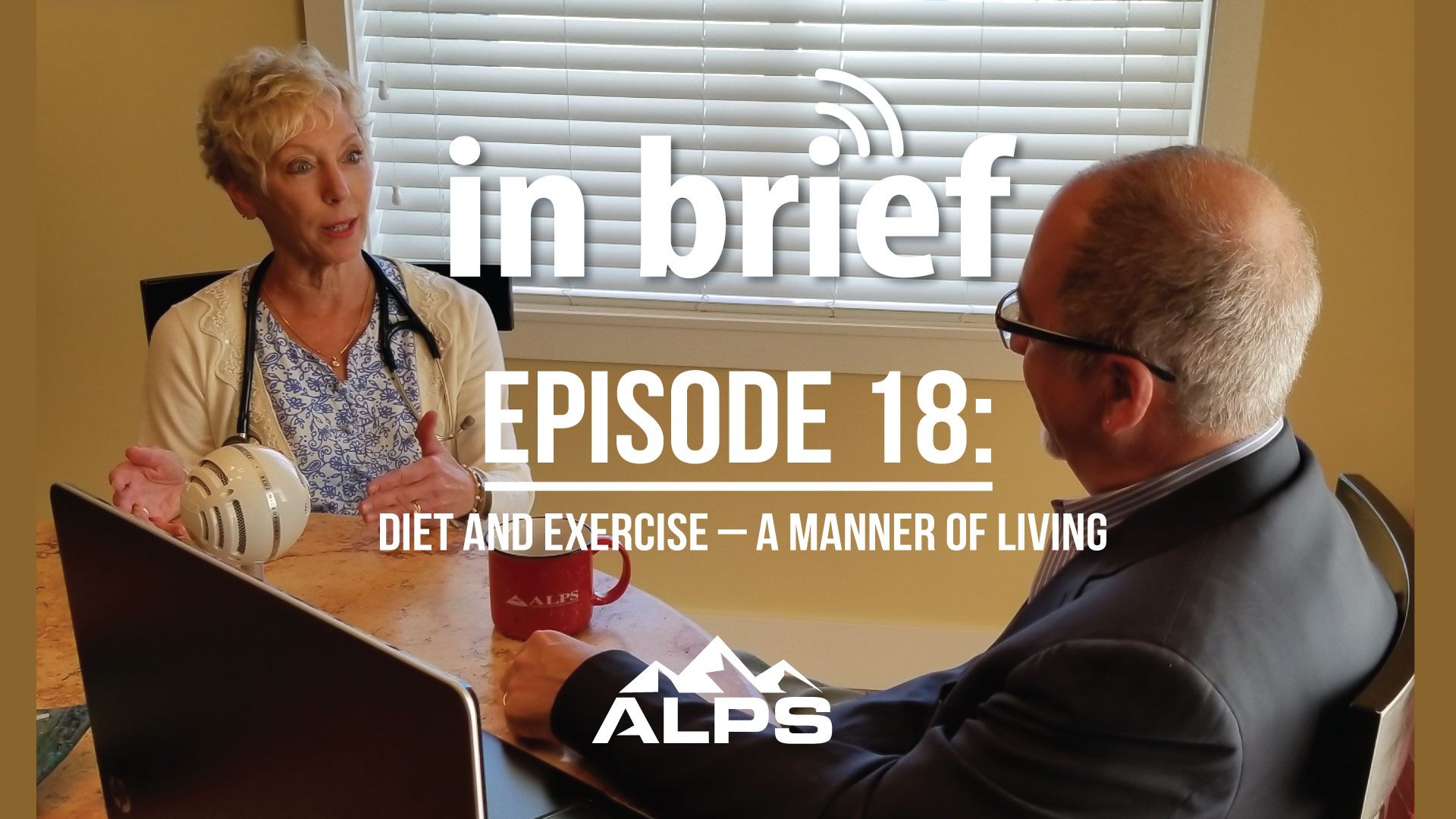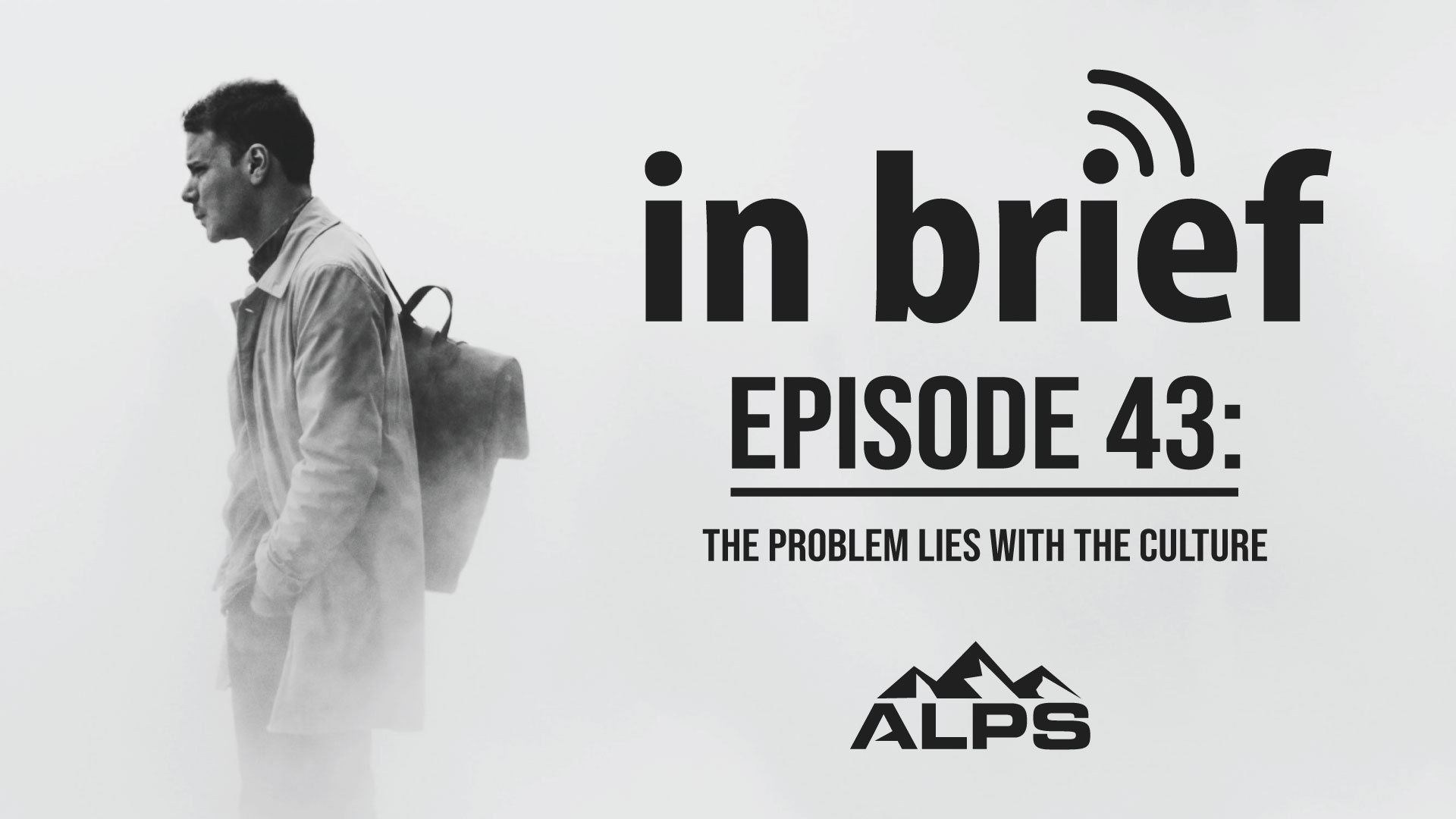7 min read
ALPS In Brief — Episode 43: The Problem Lies with the Culture
ALPS Risk Manager Mark Bassingthwaighte shares two real-world stories of attorneys struggling with behaviors that often lead to malpractice claims....
We've crafted solutions tailored to your firm
The world of insurance for law firms can be confusing, and difficult to navigate. We've created this glossary because these common insurance terms should be easy to understand.
9 min read
 Mark Bassingthwaighte, Risk Manager
:
Updated on February 28, 2024 | Posted on July 11, 2018
Mark Bassingthwaighte, Risk Manager
:
Updated on February 28, 2024 | Posted on July 11, 2018

Being busy is often an excuse for not taking care of ourselves, whether that means long days in the office or racking up the airline miles for business travel. As part of our Wellness Podcast Episodes, Mark sits down with Dr. Kathleen Baskett whose area of expertise is bariatric medicine focusing primarily on weight management. They discuss how to make the time to eat well and exercise and why healthy choices can positively affect your professional life.
ALPS In Brief, The ALPS Risk Management Podcast, is hosted by ALPS Risk Manager, Mark Bassingthwaighte.
Transcript
MARK:
Hello. This is Mark Bassingthwaighte. I’m the risk manager here at ALPS. Welcome to another episode of ALPS In Brief. We’re coming to you from the historic Florence building in beautiful downtown Missoula, Montana. I’m delighted to be able to introduce another guest this afternoon, a Dr. Kathleen Baskett. She’s a physician with St. Vincent’s Healthcare here in Billings, Montana and runs the weight management clinic. I wanted to take some time to talk with Dr. Baskett today in follow-up, or to continue on with the discussion we’ve been having on the podcast, which is a very, very hot topic among Bar Associations and within the profession now. It’s just attorney well-being.
Dr. Baskett, before we get into some more interesting discussion, can you just take a few moments and tell the audience a little bit about yourself
DR. BASKETT:
For sure. Thank you for having me. It is an honor to be here. I’ve been practicing medicine for about 30 years. My area of expertise at this point is bariatric medicine, which essentially is weight management, and it is treating people dealing with obesity. Right now in our country, obesity is the first leading cause of preventable death.
In my clinic, I’m working with people who want to lose weight in a nonsurgical manner, but also helping to care for people who are preparing for bariatric surgery, and subsequently caring for them after they’ve had that surgery.
MARK:
As you’re well aware in terms of… we’d had some time to dock and visit a little bit. You do know that I travel. I can share lawyers, whether some lawyers have quite a bit of time on the road and others just have very full days, long days. I mean, they may come home or not come home for supper, but they’re back to the office and spend time in the evening and whatnot and just maintaining even just healthy eating, healthy eating habits I think can be a challenge.
I’d love to hear your comments on the importance of a healthy diet, and then maybe following up on that, thoughts that you might have in terms of how the busy professional, whether on the road or just spending lots and lots, too much time in the office, how we might to address that so that we can help maintain just a healthy lifestyle as it relates to food.
DR. BASKETT:
For sure. In medicine today as to many of the issues that we deal with are more chronic diseases versus infectious diseases of years’ past, and the chronic diseases are really linked to the lifestyle choices that people make, obesity being the underlying cause of many to include diabetes type II, high blood pressure, elevated cholesterol, sleep apnea, even certain types of cancers.
Again, the choices that we make with our eating and activity are crucial, and it’s very difficult when people are busy, they’re working many long hours, when travel is involved because, as we know, there’s an abundance of fast and convenient type food that surround us, and it is difficult to eat in a healthier manner when we’re out on the road, or even just if you want to eat something quickly. But there is a way to eat in a healthy manner. It can be done.
MARK:
Well, practical tips. I know one of the things that I’ve learned over the years is I’ve learned about protein bars, and I’ve done a little reading and research on my own, and in conjunction with my own physician, we’ve started to move away from the high-carb diet. I used to be a guy, I mean, I would love to drop into Starbucks, get my chocolate glaze donuts and a big latte, and just, I’m back in the car, but you don’t feel well with that.
Now, learning to switch over to … For instance, one of the things I enjoy are just these protein bars that you can get from Costco. I will tend to do that. Hope on an airplane, I might have a protein bar. If I have a little time in an airport, I might stop and get some eggs or something like that, but I’m just trying to find ways to adjust, think differently, I guess. Do you find that to be a challenge? Do you …
DR. BASKETT:
Well, it is a challenge, but you can make these healthier choices. I think some of the restaurants that surround us or that we encounter are beginning to be cognizant of that and offer some healthier choices, and definitely, packing protein bars, protein drinks, healthy nuts, grabbing a yogurt instead of a soda, it’s a healthy alternative, and people truly feel better.
All of these simple carbohydrates, when after we eat them, they tend to shoot our blood sugars up quite rapidly, whether we have diabetes or not, and then those blood sugars quickly plummet, and then they begin zig-zagging throughout the day, and that really just triggers that hunger and cravings for more carbohydrates, it sets in more fatigue, and then in time, it’s a way of just eating poorly and not making healthy choices.
MARK:
One of the things that I became interested in just, you read now, and again, I’m curious as to, is this something you hear in the media, is there a truth to this, but lots of people, “I know. I’m traveling a lot, and I shouldn’t be drinking all these cokes. It’s just a lot of sugar and things, so I’ll make this switch, and I’ll jump into these zero-calorie beverages,” but at times I’ve heard that may not be the best decision. Are those drinks an appropriate alternative? If I’m going to give up Mountain Dew, can I do the zero-calorie, caffeine-
DR. BASKETT:
Do the diet Mountain Dew.
MARK:
Diet Mountain Dew. Is that-
DR. BASKETT:
Well, there has been some research that shows that some of the artificial sweeteners aren’t as healthy for us as we’d like to think that they are. Some studies have shown that they will interfere with blood sugar and insulin regulation in the GI tract. Also, some studies have shown that the artificial sweeteners will send messages to the brain to make us want to crave and desire more sweet, more carbohydrate.
I really suggest to my patients that water is that best alternative, the fine quality H2O. You can get carbonated water that’s flavored because people do like carbonated beverages. You can put slices of lime and orange and cucumber in water. An occasional zero-calorie is great, but it shouldn’t be a preponderance of one’s beverage intake during the day.
MARK:
Do you think, again, looking at the busy schedules and travel schedules and these kinds of … How much do you think that planning plays into this? Is that a way to shift gears a little bit since … What are your thoughts about that?
DR. BASKETT:
Oh, very much so, I mean, just as professionals need to plan their schedules, calendars, and timing. Planning goes a long way in helping us to eat in a healthy manner and exercise. If you know you’re going to be gone for a week just as you’re packing your clothes, gathering the information you will need for your travels, you really can sketch out a little bit what might you do for breakfast or lunch because you know where you will be, and can you throw a box of protein bars, prepackaged nuts into your suitcase, that’s something that’s pretty easy to do.
Likewise, when we’re home, meal prepping on weekends, cooking a little bit of extra and freezing makes it easy to have a pretty simple but yet healthy meal during the week.
MARK:
How about, how does exercise play into all of this in terms of, again, thinking about just healthy eating, healthy diets, overall health and the obesity component. It’s …
DR. BASKETT:
Again, I think exercise is the key. As I tell my patients, if they really want to lose weight, if they want to keep them off, exercise isn’t a luxury. It really becomes a necessity. Sometimes, they encourage them to think about, if they had cancer, would they make the time to have chemo? Everybody typically says of course they would, so if you want to lose weight and become healthier, why not choose to make the time to exercise and to eat well?
Several of my patients have told me they actually put on their calendar “time to exercise,” but they’ll put it under the guise of Wellness Committee, so for anybody else seeing their calendar, they have an appointment at 2:00 in the afternoon. They’re on a Wellness Committee, and it might mean that they’re leaving the office to go for a 20-minute walk, but it easily … Well, not easily. It does take work, and it’s hard, but it can be planned in. We can make an appointment to exercise just as we make appointments to do many other things. It becomes a commitment to ourselves.
MARK:
One of the things that I have found and was kind of fun, I don’t need this tool anymore, but it kind of started just a change. I got into one of these little Fitbit things. You set these goals, you can track yourself on the Internet, and the further you walk, well, you’ve walked across New Zealand. They give you all of these things, but I found myself trying to get steps, and even if you have a little time between planes at the airport. Instead of going into one of the Sky Clubs or Frequent Flyer Clubs or sitting down and having a bite, you just walk around a little bit and see what kind of steps you can get in.
I really like your comment. I want to underscore this in terms of, I think people tend to look at dieting, exercise, these kinds of things as maybe quick solutions and things, but they have trouble committing to it because we don’t seem to view … Well, getting overweight or getting out of shape, at least right up front, it’s not like you’re facing a diagnosis of cancer, but you’re spot on. I mean, when you look at the long-term health consequences in terms of overall well-being, but then you look at diabetes and these kinds of things, if you have diabetes or you have cancer, you are going to seek treatment and deal with it. It seems to me, I like that perspective as a way to encourage myself. I just think that’s a great, great approach.
The one other thing I’d like to visit on a little bit, how … I just use the word diet as an example, and people will go in, and first of the new year, they make these resolutions. But diet really isn’t the appropriate way to look at this. I mean, do you have thoughts about the term diet. To me, I’ve come to learn, I think that becomes a problem. It isn’t about diet. Am I correct?
DR. BASKETT:
Well, I would agree, and I usually don’t use the word diet when I’m working with my patients. We talk about eating plan. Many of my patients will reference diet, and I tend to guide them with the different choices of words because the diet is something that people go off of. My goal when working with patients is to help them truly make lifestyle change. It’s lifestyle change and making changes and habits that will help someone stay at his or her new weight.
It’s interesting, the Greek word for diet is diaita, and what that truly means is manner of living. For me, that’s what this is all about.
MARK:
I love that. I love that. We’re just about out of time here. I guess I’ll give you a moment if you have any final comment or thought to share in terms of people that are just … Again, busy, busy days, wanting to make the change, thinking about it might be a good thing to do and all that, but it’s just getting started. Do you have any final closing thoughts of encouragement or an idea of how to make this kind of a change?
DR. BASKETT:
Well, what I would say is it doesn’t have to be all or nothing. Some people often think, “Gosh, if I don’t go to the gym and workout for 60 minutes, why bother,” or, “If I don’t eat salads three times a day and healthy protein, and then I had a bowl of ice cream, then I have blown my, quote, ‘diet.’ I’ll just forget about it.” You just have to start somewhere. Maybe it’s a matter of truly taking a five-minute walk when you have that little break in between appointments with clients or you have 10 minutes during your lunch, and it’s a beautiful day outside, and you can walk around the block.
You had a bad day, and maybe you overate or you had too many sweets. The answer to that would be so? So what could you do differently the next day? It doesn’t mean that you give up. You just have to start somewhere, and you build on one habit at a time, little by little.
Interestingly, research shows that people don’t need to lose all of their excess body weight to improve health. Research shows that if people can lose 5-10% of their initial body weight, they can markedly reduce their health risks. It can be overwhelming for somebody who weighs 300 pounds and that may be ideally should weigh 150 thinking, “Where do I begin?” but if that person could lose 15-30, that’s a marked difference and a marked improvement in health.
MARK:
Yeah. Interesting. I like the old saying, every successful journey starts with that very first step-
DR. BASKETT:
It’s a great saying. It’s a great saying.
MARK:
It’s just … I like keeping the focus on where we’re at getting started as opposed to, “I have to do it all right now.” Well, listen, Dr. Baskett, it’s indeed been a pleasure. I really appreciate you taking the time to sit down and share a few thoughts with our audience.
To those listening, I hope you found something of value in today’s discussion, and please feel free to reach out any time if any of you have any thoughts in terms of topics of other folks that you’d like to see if we can have join us on the podcast.
Thanks for listening. Oh, and my email address, if you’d like the reach out mbass@alpsnet.com. That’s again, mbass@alpsnet.com (Note: Mark's email is now mbass@alpsinsurance.com). Thanks much. Bye-bye.
Dr. Kathleen Baskett
For Dr. Baskett, medicine is not a job; it’s a calling. A firm believer in patient-centered care, she works daily to help each patient reach his or her optimal health and quality of life. She takes the time to get to know each patient, sharing in their joys and sorrows, celebrations and setbacks as they navigate their weight loss journey.
Dr. Baskett is board-certified in bariatric medicine. She attended the University of Maryland School of Maryland and completed an internship within the University of Maryland Medical System. When not treating patients, she enjoys exercising, practicing yoga, being outdoors and traveling. She also loves to spend time with her family.
ALPS In Brief Podcast Intro/Outro Music: Walk In The Park by Audionautix is licensed under a Creative Commons Attribution 4.0 license. https://creativecommons.org/licenses/by/4.0/
Artist: http://audionautix.com/
Mark Bassingthwaighte, Esq., serves as Risk Manager at ALPS, a leading provider of insurance and risk management solutions for law firms. Since joining ALPS in 1998, Mark has worked with more than 1200 law firms nationwide, helping attorneys identify vulnerabilities, strengthen firm operations, and reduce professional liability risks. He has presented over 700 continuing legal education (CLE) seminars across the United States and written extensively on the topics of risk management, legal ethics, and cyber security. A trusted voice in the legal community, Mark is a member of the State Bar of Montana and the American Bar Association and holds a J.D. from Drake University Law School. His mission is to help attorneys build safer, more resilient practices in a rapidly evolving legal environment.

7 min read
ALPS Risk Manager Mark Bassingthwaighte shares two real-world stories of attorneys struggling with behaviors that often lead to malpractice claims....

12 min read
Mark shares some stories of cancelled flights, employment emergencies, and more, to illustrate a timely point: When things go off the rails, being...

11 min read
As we transition to more permanent work-from-home schedules, the lack of supervision and a diminished sense of community could have bigger...